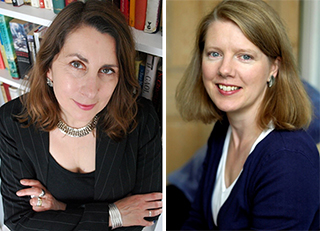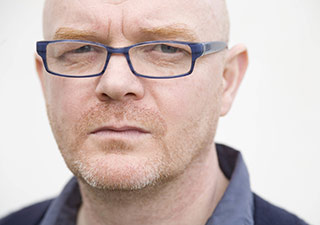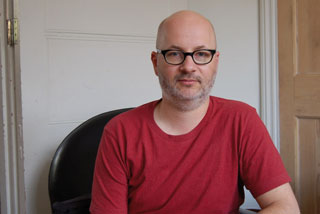
SALLY O’REILLY:
Hello Emma, nice to see you.
EMMA DARWIN:
Hello Sally.
SALLY O’REILLY:
One of the things that people are very concerned about with historical fiction is research and this idea that you need to get things right. As somebody who was interested in history to start off with, did that fascinate you more than daunt you? Do you like the fact that you have to familiarise yourself with certain things before you can begin the story, or does it not work that way for you?
EMMA DARWIN:
I’m equally fascinated and exasperated. I mean John Gardner in The Art of Fiction talks about how it’s… we have to get our reader to agree to forget that this stuff never happened in a novel, that’s the contract, and their side of the contract is that they will set aside their underlying knowledge that this is made up. And in return for which we will deal truthfully with them and also that we will convince them by the reality and the detail of how we build this story because if that is real, is convincing, if the ‘scratch and sniff’ feels right, then the story is presented to them as something that really happened and their contract is that they’re able to buy into it.
So you need to do the factual research from that point of view and if you really get it wrong, then the contract is broken and either the reader consciously says this is not some… this person doesn’t know her history, or the reader tries to keep reading but, you know, again what Gardner calls the fictional dream is broken, you know. And it’s a bit like failing your driving test, you can either fail it on one catastrophic idiotic mistake by making your medieval peasants eat potatoes or putting a gramophone into your English civil war story, or you can fail it on just a gentle, unconvincingness, or a cowardice, just pulling back from things you can’t be bothered to research but you can’t find out, which just makes it less believable.
But I think John Mullan in How Novels Work makes a very interesting point about this which is that in a way if you do pile in the bibliographies the, you know, the historical notes, the further reading and… and all the rest of it, that’s sort of apologetic. You’re confessing to a sort of lesser status, you’re explaining yourself, and, on the whole, I’m on his side. Having said that, my second novel The Secret Alchemy does have a historical note at the end, it’s the story of the mother and the uncle of the princes in the tower and I had deliberately set up a very episodic structure for that…
SALLY O’REILLY:
Right.
EMMA DARWIN: …covering quite a lot of ground, and I just thought I think it’s fair enough if someone, having been dropped into thick ‘scratch and sniff’, as it were, at various points through these lives, it’s fair enough for them to want to have a kind of overview. So I did do that but what I didn’t do was explain my particular decisions because they were all about trying to create a story that has this sense of wholeness. Writing a novel is a process of synthesis and you are always waltzing to and fro over the boundary between fact and fiction, with as small a bump as possible, preferably no bump at all. SALLY O’REILLY: Yeah. EMMA DARWIN: And having gone to a lot of trouble to do that I wasn’t going to write long notes explaining exactly where the bump was.
SALLY O’REILLY:
Do you think also that this way that people read stories in this kind of literalist way relates to the way that they perceive history, and the more I kind of delved and researched and obviously the Early Modern period, it’s not like researching the twentieth century…
EMMA DARWIN:
No.
SALLY O’REILLY:
But, there’s quite a lot there, there’s quite a lot of paper…
EMMA DARWIN:
Yeah.
SALLY O’REILLY:
…that survived, but everything is partial, everything is partisan, everything is subjective and historical facts, you know, I found when I was researching the life of Shakespeare, one of the characters in my book, is extremely flimsy. And people have in the past projected their own version of Shakespeare – different writers, different playwrights – on to these very few facts and created a… a fake Shakespeare that’s become a sort of national icon in a strange way. This made me question the whole issue of what is true in my research in a different way, I just wondered if that had been the same for you.
EMMA DARWIN:
Oh I think absolutely, I mean an awful lot of what people call the facts are actually… well for one thing they’re the record.
SALLY O’REILLY:
Yes.
EMMA DARWIN:
They’re not the facts. They are the things that someone, usually a dead, white male, you know, chose to write down and he was a dead, white male from the winning side generally speaking.
SALLY O’REILLY:
Yes.
EMMA DARWIN:
And Rose Tremain again, who is always interesting about writing, has this fantastic essay called The First Mystery and she says, ‘In novel writing the factual or experiential has to find its own mysteriousness. By this I mean that all the research done for a novel, all the studying and reading, all the social fieldwork, all the location visiting, all the garnering of what is or what has been, must be reimagined before it can find a place in the text. It must rise into the orbit of the anarchic, gift-conjuring, unknowing part of the novelist’s mind before it can acquire its own truth for the work in question.
Graham Greene, when asked by journalists how he would make use of an important experience he’d had in South East Asia, replied, “It’s yours to remember and mine to forget.” He was talking about the novelist’s task of reimagining reality.
Reimagining implies some measure of forgetting. The actual or factual has to lose definition, become fluid, before the imagination can begin its task of reconstruction. Data transferred straight from the research area to the book will simply remain data, it will be imaginatively inert.’
And I know that from my own in the sense that I never write worse than when I’ve got the textbook in the other hand, because try as I will to send it through my mind it has a strange way of going straight in through my eyes and out on to the page and reading like textbook, and I think we’ve all read historical fiction where that was true.
SALLY O’REILLY:
I think that’s really interesting and I think one of the things is this thing about defamiliarisation, is taking what is a cliché repertoire of things that we associate with a particular period, and for Early Modern London there’s all kinds of assumptions and there’s a sort of template for what we think Elizabethan London looked like.
And I certainly kind of got hold of that and I’ve discovered things like it was much smellier, th… it was much more industrialised, it was much more stinky and noisy. On the other hand there were oak trees growing in the highways, there was Roman ruins around the place which people forget that history layers on top of itself. And there were lots of people from different ethnic minorities there, there were a substantial number of people from outside Europe.
There was a small number of black people, mainly originally brought across as slaves. But a really interesting thing is women, no agency, absolutely right, all these things are true, except that, you know, women were constantly subverting this and there were a lot of women who were widows who would then inherit their husband’s business, but a woman who inherited her husband’s printing firm actually could join the stationers’ register and she retained that even when she remarried. So of all the trades the women printers actually had enormous amounts of power and one of them published Shakespeare – Venus and Adonis.
And fashion, the London Corporation, the London council would try and control what women wore and women would constantly burst out wearing exotic clothes when their status didn’t allow them to. So I think, for me, that’s one of the areas where writing is great, you can… you can take the exception and you can make that be one of your characters, and it may not represent… where the historian has to present what’s normal you’re presenting what’s exceptional and interesting. In a way it’s like you do enough research to imagine with confidence, don’t you, so once you get to a certain point you think, I can put this in and I can hold my hand up to it, and not everyone is going to like anything you write…
EMMA DARWIN:
Yeah.
SALLY O’REILLY:
But as long as you’ve got that sense of authority, sufficient authority, then the story rules, I think, and as you say that’s…
EMMA DARWIN:
I think that, yes, yes.
SALLY O’REILLY:
…that’s why you don’t need a historical note, it’s a story that you constructed…
EMMA DARWIN:
It’s a story, yes.
SALLY O’REILLY:
…out of research and imagination.





Rate and Review
Rate this audio
Review this audio
Log into OpenLearn to leave reviews and join in the conversation.
Audio reviews